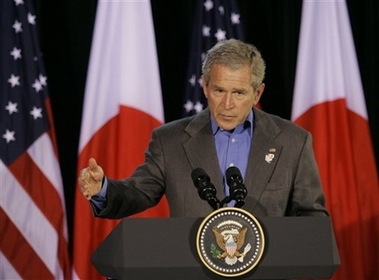Bush warns Congress over Iraq timetables
(AP)Updated: 2007-04-28 08:41
CAMP DAVID, Md. - US President Bush warned Congress Friday that he will continue vetoing war spending bills as long as they contain a timetable for the withdrawal of American troops from Iraq.
 US President Bush gestures during his joint press availability with Japanese Prime Minister Shinzo Abe, not shown, Friday, April 27, 2007 at Camp David, Md., Friday, April 27, 2007. [AP]  |
But he made clear that if Democrats insist on including timetables again, he will not hesitate to bring out his veto pen.
"If they want to try again that which I've said is unacceptable, of course I won't accept it," the president said during a news conference here with Japanese Prime Minister Shinzo Abe. "I hope it won't come to that."
Passage of the Iraq spending legislation in both houses was not by big enough margins to override a presidential veto. So lawmakers and the White House immediately began talking about a follow-up bill.
Democratic leaders said they hoped to have one ready by June 1. Several Democratic officials have said the next measure likely will jettison the withdrawal timetable, but may include consequences if the Iraqi government does not meet certain benchmarks, such as expanding democratic participation and allocating oil resources.
Bush has set benchmarks for the Iraqi government, but has steadfastly opposed attaching any timeframe to them or requiring any actions if they are not met.
Senate leaders said Friday that the bill approved Thursday should go to Bush early next week. The White House has not said whether Bush plans a quiet veto or a public ceremony. Spokeswoman Dana Perino said it was unlikely that Bush would use a Tuesday trip to the Tampa, Fla.-based headquarters of Central Command, which oversees military operations in the Middle East, including Iraq, for the veto.
"I invited the leaders of the House and the Senate to come down soon after my veto so we can discuss a way forward," the president said. "I'm optimistic we can get a bill, a good bill and a bill that satisfies all our objectives."
Later, White House deputy press secretary Scott Stanzel said invitations were extended Friday afternoon to nine top congressional leaders, from both parties, to come to the White House on Wednesday.
Senate Majority Leader Harry Reid, D-Nev., urged Bush on Friday to "carefully read this bill."
"He will see it fully provides for our troops and gives them a strategy worthy of their sacrifices," Reid said. "Failing to sign this bill would deny our troops the resources and strategy they need."
The bill would provide $124.2 billion, more than $90 billion of which would go for the wars in Iraq and Afghanistan. Democrats added billions more for domestic programs, and while most of the debate focused on the troop withdrawal issue, some of that extra spending also has drawn Bush's criticism.
The legislation requires a troop withdrawal to begin July 1 if Bush cannot certify that the Iraqi government is making progress in disarming militias, reducing sectarian violence and forging political agreements, otherwise by Oct. 1.
While the beginning of a withdrawal is mandated, the balance of the pullback is merely advisory, to take place by April 1, 2008. Troops could remain after that date to conduct counterterrorism missions, protect US facilities and personnel and train Iraqi security forces.
Abe was given the coveted invitation to the Camp David presidential retreat in part as a gesture of appreciation for Tokyo's commitment to the wars in Iraq and Afghanistan. Japan is the largest financial contributor, after the United States, for the rebuilding effort in Iraq, and is the third largest contributor in Afghanistan. Japanese defense forces have conducted refueling operations for the US and coalition forces.
Abe expressed thanks "for the noble sacrifice the United States is making" in Iraq. On Thursday, the Japanese leader went to Arlington National Cemetery to pay respects to US war dead, and visited injured troops at Bethesda Naval Hospital.
"The president expressed his strong determination to carry through for the task of Iraq's reconstruction," Abe said. "And I told the president that Japan understands and supports US efforts for the stabilization and reconstruction of Iraq and Japan will carry on its own efforts to the same end."
|
||
|
||
|
|